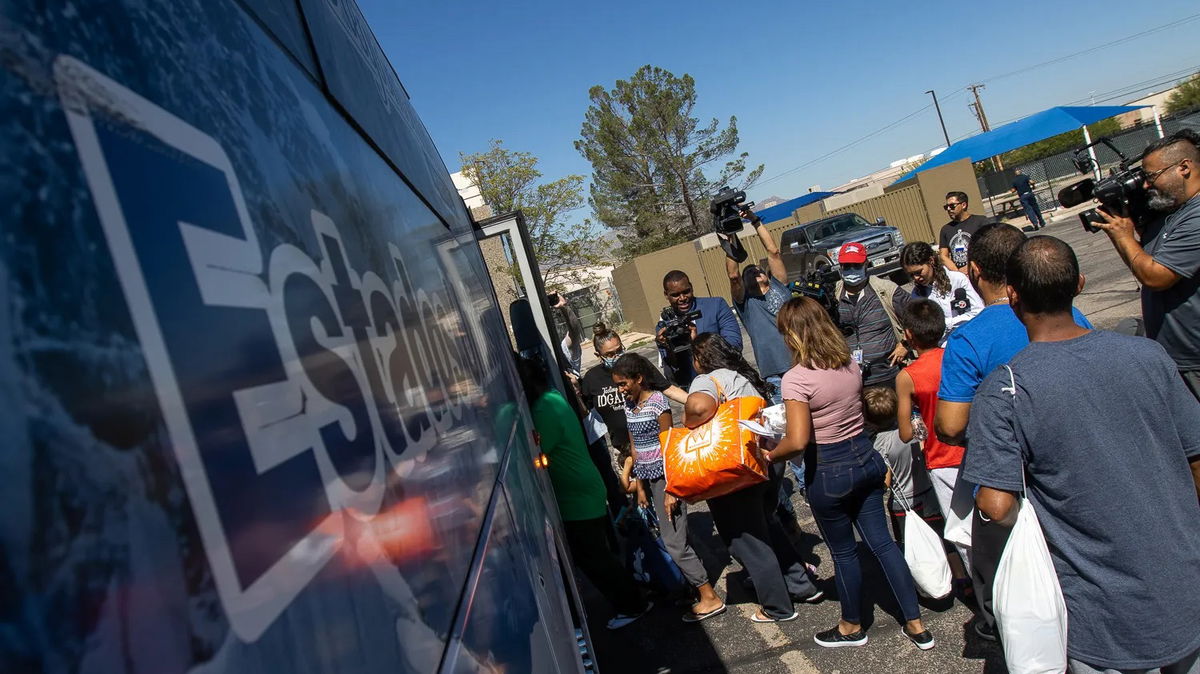El Paso city government spending $300,000 a day on migrant response

The El Paso city government may spend $10 million this month processing and transporting recently arrived migrants, 10 times the amount spent between 2019 and August of this year, officials said.
The rising costs – now reaching $300,000 a day and expected to grow – come as city officials express concern that the Federal Emergency Management Agency is taking months to reimburse the expenses.
“I don't think anybody's expecting relief anytime soon. Obviously we've been in close contact with the federal government on sort of the overall issue, but I don't think anybody's expecting it to get any better anytime soon,” Robert Cortinas, the chief financial officer for the city government, said Monday.
Border Patrol officials have said they’ve been apprehending more than 1,300 migrants a day in the El Paso sector, many from Venezuela. That has led to large numbers of migrants being released to the streets of El Paso because the Border Patrol’s Central Processing Center and shelters run by non-governmental organizations are at capacity.
Immigrant advocates have said Venezuelan migrants differ from Central Americans who have accounted for much of the migration at the Southwest border over the past decade.
The Venezuelans are less likely to have established family networks in the United States and more likely to have little money when they arrive in the United States, making it more difficult for them to move from the border after crossing.
Also, because their home country refuses to accept U.S. return of its nationals, and Mexico has been reluctant to receive them, Venezuelans generally haven't been expelled from the United States under Title 42, a public health law that has been invoked since 2020 to keep migrants from many other countries from entering the United States.
That means that Venezuelans must be processed by the Border Patrol and – unless they have criminal records or are determined to pose some kind of threat – released into the United States while immigration courts consider their cases.
Reuters reported last week that the United States has asked Mexico to accept more Title 42 expulsions of Venezuelans, Cubans and Nicaraguans, despite the Biden administration's public position that it is trying to wind down use of the controversial program begun by the Trump administration.
Data released by Customs and Border Protection on Monday showed that the number of Venezuelans encountered by Border Patrol and CBP officials in the El Paso region – which includes far West Texas and all of New Mexico – reached more than 3,500 in August.
That’s twice as many encounters with Venezuelans in the El Paso area than in the prior three years combined. Data for September encounters won’t be released until next month, but likely will be well above the August numbers.
Many of the migrants who couldn’t get into shelters have been congregating outside the Greyhound bus station for the past two weeks, but city officials over the weekend said they moved people away from the encampment and into shelters and hotels.
The bulk of the city’s expenditures has gone to charter buses to take migrants to other communities. The city has sent 59 buses to New York City and four to Chicago since the beginning of September, transporting 2,950 migrants to those destinations, city spokesperson Laura Cruz-Acosta said Monday.
She said the city currently is averaging six charter buses a day. El Paso officials have said the people boarding the buses are going to their desired destinations and local officials work with receiving cities to ensure appropriate services are available at the end of the trip.
Although costly, the charter buses are the most efficient way to move large numbers of migrants to their preferred destinations, Cortinas said.
“We're right now trying to evaluate other potential options, some other alternatives to provide, whether it's on a train or some other form of transportation to help these individuals get to where they're trying to get to,” he said.
The city has had to divert resources, particularly from public safety functions, to assist with migrant processing, housing, feeding and transportation.
“It's Fire Department, Police Department, Public Health, Sun Metro. Just about every department right now is being impacted,” Cortinas said.
The Federal Emergency Management Agency has said it will reimburse cities – both on the border and in the nation’s interior – for costs incurred while helping large numbers of border crossers.
But city officials say it has been taking months to get repayment from FEMA. The federal agency last week reimbursed $84,526 of expenses incurred in the last three months of 2021, 221 days after the application was submitted. That was almost two months longer than it took to process two other reimbursements from 2021 that totaled almost $160,000.
Cortinas said the city has talked with FEMA about ways to speed up reimbursements, particularly as costs escalate.
“Right now, it's a quarterly basis that we're doing the reimbursement. We talked about, can we do a monthly reimbursement? Is there any opportunity to do up front (payments), at least for a portion of the cost?” he said.
Officials with FEMA, which also is responding to large disasters in Alaska and Puerto Rico, said they couldn’t immediately respond to El Paso Matters’ questions on the city’s concerns about reimbursements.
Cortinas said the city government’s support of migrants passing through El Paso is the right thing to do.
“I've read articles, and you read comments about people saying, why are we doing this? Why are we funding it? Well, because it's our community,” he said, adding that the city is “just ensuring the safety, the wellbeing, not only for the people that live here, but the people that are traveling through and trying to get to their own destination.”
This article first appeared on El Paso Matters and is republished here under a Creative Commons license.![]()
